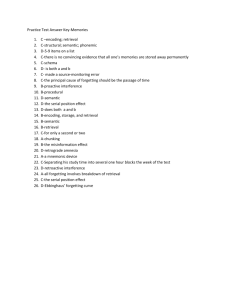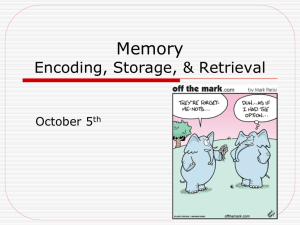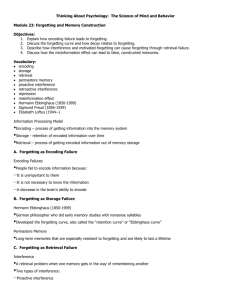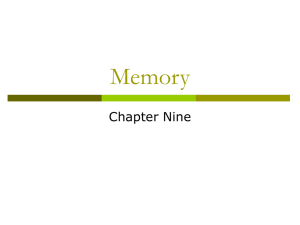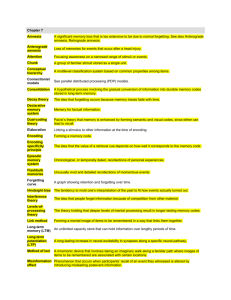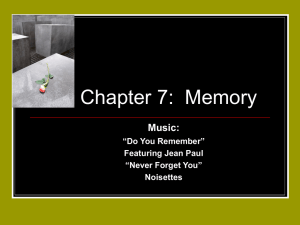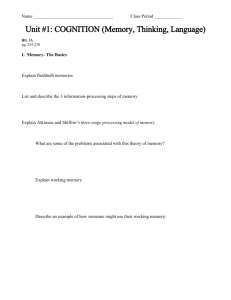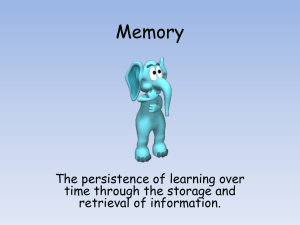Bolt EP7/e LG08.51-58B
advertisement
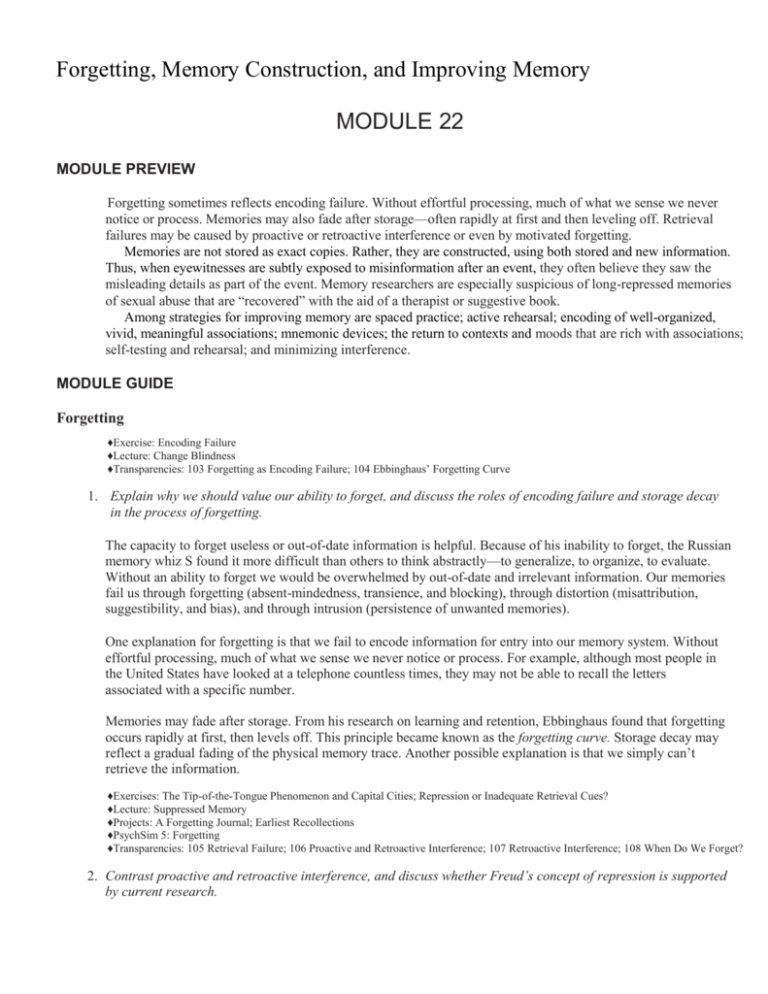
Forgetting, Memory Construction, and Improving Memory MODULE 22 MODULE PREVIEW Forgetting sometimes reflects encoding failure. Without effortful processing, much of what we sense we never notice or process. Memories may also fade after storage—often rapidly at first and then leveling off. Retrieval failures may be caused by proactive or retroactive interference or even by motivated forgetting. Memories are not stored as exact copies. Rather, they are constructed, using both stored and new information. Thus, when eyewitnesses are subtly exposed to misinformation after an event, they often believe they saw the misleading details as part of the event. Memory researchers are especially suspicious of long-repressed memories of sexual abuse that are “recovered” with the aid of a therapist or suggestive book. Among strategies for improving memory are spaced practice; active rehearsal; encoding of well-organized, vivid, meaningful associations; mnemonic devices; the return to contexts and moods that are rich with associations; self-testing and rehearsal; and minimizing interference. MODULE GUIDE Forgetting ♦Exercise: Encoding Failure ♦Lecture: Change Blindness ♦Transparencies: 103 Forgetting as Encoding Failure; 104 Ebbinghaus’ Forgetting Curve 1. Explain why we should value our ability to forget, and discuss the roles of encoding failure and storage decay in the process of forgetting. The capacity to forget useless or out-of-date information is helpful. Because of his inability to forget, the Russian memory whiz S found it more difficult than others to think abstractly—to generalize, to organize, to evaluate. Without an ability to forget we would be overwhelmed by out-of-date and irrelevant information. Our memories fail us through forgetting (absent-mindedness, transience, and blocking), through distortion (misattribution, suggestibility, and bias), and through intrusion (persistence of unwanted memories). One explanation for forgetting is that we fail to encode information for entry into our memory system. Without effortful processing, much of what we sense we never notice or process. For example, although most people in the United States have looked at a telephone countless times, they may not be able to recall the letters associated with a specific number. Memories may fade after storage. From his research on learning and retention, Ebbinghaus found that forgetting occurs rapidly at first, then levels off. This principle became known as the forgetting curve. Storage decay may reflect a gradual fading of the physical memory trace. Another possible explanation is that we simply can’t retrieve the information. ♦Exercises: The Tip-of-the-Tongue Phenomenon and Capital Cities; Repression or Inadequate Retrieval Cues? ♦Lecture: Suppressed Memory ♦Projects: A Forgetting Journal; Earliest Recollections ♦PsychSim 5: Forgetting ♦Transparencies: 105 Retrieval Failure; 106 Proactive and Retroactive Interference; 107 Retroactive Interference; 108 When Do We Forget? 2. Contrast proactive and retroactive interference, and discuss whether Freud’s concept of repression is supported by current research. Retrieval failure can occur if we have too few cues to summon information from long-term memory. It may also happen when old and new information compete for retrieval. In proactive interference, something we learned in the past interferes with our ability to recall something we have recently learned. In retroactive interference, something we have recently learned interferes with something we learned in the past. With his concept of repression, Sigmund Freud proposed that our memories are self-censoring. To protect our selfconcepts and to minimize anxiety, we may block from consciousness painful memories and unacceptable impulses. In Freud’s view, this motivated forgetting submerges memories but leaves them available for later retrieval under the right conditions. Increasing numbers of memory researchers think repression rarely, if ever, occurs. More typically, we have trouble forgetting traumatic experiences. Memory Construction ♦Lectures: Misremembering the Causes of Behavior; The Misinformation Effect; True Photos and False Memories; False Memories Surrounding the Iraq War; Source Amnesia ♦Exercises: Creating a False Memory; Eyewitness Testimony—What Have We Learned?; Eyewitness Recall ♦Project: Constructive Memory ♦PsychSim 5: Trusting Your Memory ♦Video: Segment 17 of the Scientific American Frontiers Series, 2nd ed.: True or False? 3. Explain how misinformation, imagination, and source amnesia can distort our memory of an event. Memories are not stored as exact copies, and they certainly are not retrieved as such. Rather, we construct our memories, using both stored and new information. In many experiments around the world, people have witnessed an event, received or not received misleading information about it, and then taken a memory test. The repeated result is a misinformation effect: After exposure to subtle misinformation, many people misremember. Asking leading questions can plant false memories. As people recount an experience, they fill in their memory gaps with plausible guesses. Other vivid retellings may also implant false memories. Even repeatedly imagining and rehearsing nonexistent events can create false memories, called imagination inflation. Our memory for the source of an event is particularly frail. In source amnesia, we attribute to the wrong source an event that we have experienced, heard about, read about, or imagined. Thus, we may recognize someone but have no idea where we have seen the person. Or we imagine or dream an event and later are uncertain whether it actually happened. ♦Lecture: Repressed Memories of Abuse 4. Discuss whether young children’s eyewitness reports are reliable and the controversy over reports of repressed and recovered memories. Because memory is often reconstructive, we can’t be sure a memory is real by how real it feels. Preschool children are particularly sensitive to suggestion, and their recollections of sexual abuse may be prone to error. When researchers have used suggestive interviewing techniques, they have found that most preschoolers and many older children can be induced to report false events. However, even young children can accurately recall events if a neutral person talks to them in words they can understand and uses less suggestive, more effective techniques. Innocent people have been falsely convicted of abuse that never happened, and true abusers have used the controversy over recovered memories to avoid punishment. Forgetting of isolated past events, both negative and positive, is an ordinary part of life. Cued by a remark or an experience, we may later recover a memory. Controversy, however, focuses on whether the unconscious mind forcibly represses painful experiences and whether they can be retrieved by therapist-aided techniques. Memories “recovered” under hypnosis or drugs are especially unreliable, as are memories of things happening before age 3. Traumatic experiences are usually vividly remembered, not banished into an active but inaccessible unconscious. Improving Memory ♦ Lecture: Making Doctors’ Instructions More Memorable 5. Explain how an understanding of memory can contribute to effective study techniques. The SQ3R (survey, question, read, rehearse, review) technique used in the text is designed to enhance learning and memory. The psychology of memory suggests several effective study strategies. These include overlearning, using spaced practice; active rehearsal; making new material personally meaningful by relating it to what is already known; mnemonic techniques; mentally recreating the contexts and moods in which the original learning occurred in order to activate retrieval cues; minimizing interference, for example, by studying just before sleeping; and testing one’s knowledge both to rehearse it and to determine what must still be learned.

